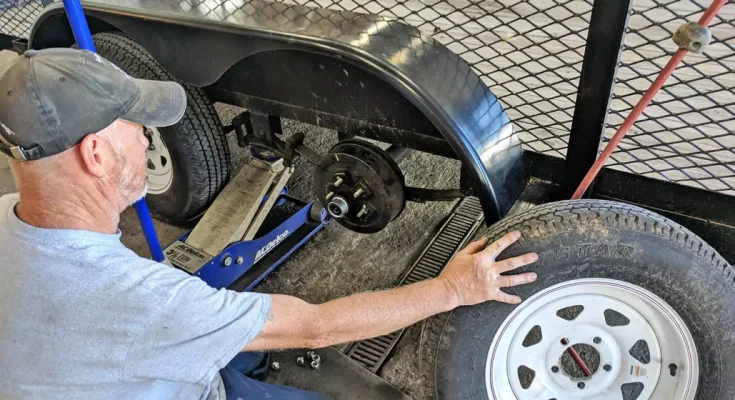Your trailer is an essential tool, whether you use it for work, hauling equipment, or weekend adventures. Like any investment, it needs regular maintenance to ensure safety, longevity, and peak performance. Neglecting your trailer can lead to costly repairs, breakdowns, or even dangerous situations on the road.
To help you protect your investment, we’ve put together a simple year-round maintenance guide to keep your trailer in excellent condition.
1. Inspect Tires Regularly
Tires are one of the most critical components of your trailer. Worn-out or improperly inflated tires can lead to blowouts, poor handling, and increased fuel consumption.
What to check:
- Tire pressure: Trailer tires lose pressure over time, especially during cold weather. Check monthly and before every trip.
- Tread depth: Make sure the tread isn’t worn below the legal limit (typically 2/32” or more for trailers).
- Cracks or dry rot: Inspect sidewalls for cracks, bulges, or signs of dry rot—especially if the trailer sits unused for long periods.
Pro tip: Don’t forget to check your spare tire too!
2. Grease Bearings and Moving Parts
The wheel bearings on your trailer take a lot of abuse, especially during long hauls or heavy loads. Over time, lack of lubrication can cause them to seize, resulting in expensive repairs or even accidents.
What to do:
- Repack wheel bearings at least once a year or every 12,000 miles (depending on usage).
- Lubricate other moving parts such as hinges, couplers, jacks, and ramp springs to prevent rust and wear.
Pro tip: Consider investing in bearing protectors for easy maintenance and added protection.
3. Check and Service the Brakes
If your trailer is equipped with electric brakes (common on tandem-axle or heavier trailers), regular inspection is vital. Malfunctioning brakes can significantly increase stopping distances and put you and others at risk.
What to check:
- Inspect brake pads and shoes for wear.
- Test the brake controller and ensure it applies power smoothly to the trailer brakes.
- Examine wiring connections and look for corrosion.
Pro tip: Have a professional inspect and adjust the brakes annually, especially if you’re hauling heavy loads.
4. Inspect and Maintain Lights and Wiring
Lights aren’t just about visibility—they’re also legally required. Faulty lights can lead to accidents and tickets.
What to check:
- Test all brake lights, tail lights, and turn signals before each trip.
- Inspect wiring for exposed or frayed wires, corrosion, and secure connections.
- Check that your trailer plug is clean and free from moisture or dirt.
Pro tip: Apply dielectric grease to wiring connectors to protect them from corrosion and moisture.
5. Examine the Frame and Undercarriage
Your trailer’s structural integrity is just as important as its mechanical components. Over time, road salt, moisture, and general wear can cause rust or damage.
What to check:
- Look for rust, cracks, or dents along the frame, cross members, tongue, and coupler.
- Pay special attention to welds and joints.
- If you notice excessive rust, clean it, apply rust-inhibitor primer, and repaint the area.
Pro tip: If you live in areas with harsh winters, wash the underside regularly to remove salt buildup.
6. Check Fasteners and Hardware
Loose bolts, nuts, or screws can cause critical components to fail, especially on rough roads.
What to do:
- Inspect and tighten all fasteners, including those on fenders, ramps, couplers, and railings.
- Check that your safety chains, tie-down points, and D-rings are secure and not damaged.
Pro tip: Keep a small toolkit with wrenches and sockets specific to your trailer for quick fixes on the road.
7. Seasonal Maintenance Tips
Spring/Summer:
- Inspect tires for heat-related wear after long trips.
- Test brakes and lights after winter storage.
- Apply fresh grease to bearings and moving parts.
Fall/Winter:
- Winterize your trailer if it will sit unused (remove valuables, cover or store indoors).
- Inspect for rust and apply undercoating if needed.
- Reduce tire pressure slightly if storing to prevent flat spots.
Final Thoughts
Regular trailer maintenance doesn’t have to be complicated—but it does require consistency. By following this checklist year-round, you’ll extend the lifespan of your trailer, stay safe on the road, and avoid costly breakdowns when you least expect them.
Need professional servicing or parts? Our team in idaho trailer sales offers maintenance packages and trailer accessories to keep you rolling smoothly. Reach out today to learn more!




